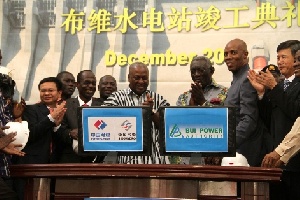The general economic condition in 2013 was challenging, with businesses and consumers mostly affected. Many companies cried for help over the high cost of doing business in the country.
Whilst workers were being laid off by the country's mining companies due to a fall in the world market price for gold, the Association of Ghana Industries (AGI) was clearly unhappy, issuing series of cautions to government that manufacturing firms will have no option than to lay off workers if government remained adamant to the rising cost of production.
Four out of five times this year, businesses according to the Bank of Ghana’s regular surveys reported weak sentiments on the economy as the eight-month long election petition created uncertainty amid serious energy crisis which slowed down economic activities across board.
For consumers, confidence dipped in three of the five survey rounds due to worries over rising inflation and the knock-on effect of low business confidence which reduced employment prospects significantly.
As the year comes to a close, www.ghanaweb.com, the biggest online media in Ghana presents ten top business news items that made headlines in 2013, with a lot of public interest and varied discussions:
Introduction of new taxes
Government of Ghana through the Ministry of Finance announced the introduction of new taxes to raise money to develop the economy in its 2013 fiscal policy statement. Finance Minister, Seth Terkper, who presented the 2013 Budget Statement to Parliament, explained that the country's tax regime had remained largely unchanged for a very long time even though situations had changed.Click here to read more
Removal of petroleum subsidies
Government this year did not spare the effort in its attempt to have fuel subsidy removed. Finance Minister Seth Terkper stated that the decision to remove fuel subsidies had been long overdue.
His decision received sharp backing from the then Minister-designate for Financial and Allied Institutions, Mr. Fiifi Kwetey, who mounted a vociferous campaign for the removal of fuel subsidies.Read more on petroleum subsidies debate
Energy Crisis
The Bank of Ghana (BoG) stated that the country’s energy crisis had had a negative impact on business confidence and optimism.
The country experienced power supply shortfall against rising demand leading to blackouts especially in the capital, Accra.To read more on 2013 energy crisis click here
Utility tariffs increase
On Wednesday September 25, 2013, the PURC announced increases in electricity tariffs to as much as 78.9 percent while the rates for water rose by 52 percent with effect from October.
The PURC maintained that the actual increase should have been 150 percent, but it beat down the utilities’ requests due to concerns of stakeholders, including labour unions and the employers’ association.Click here to read more
Ghana Gas refused to flow
Ghana’s dream in 2013 of producing natural gas to cut the millions of dollars VRA spends in purchasing daily crude for power generation was threatened as the Ghana National Gas Company (GNGC) was wreath in a miasma of financial and structural challenges.
The project which is to process 150 million Standard Cubic Feet of raw gas per day from the Jubilee Oilfield was to be enjoyed December, 2013 but was billed to be completed by the end of April, 2014.Click this link to read more
Single Spine /Labour agitation
The year 2013 witnessed a lot of labour agitations and industrial unrest against the government of Ghana over the implementation of Single Spine Salary Structure (SSSS), allowances and other remunerations.
Professor Augustine Fosu of the Institute of Statistics, Social and Economic Research (ISSER) on Thursday October 10, stated that the SSSS was a major headache to Ghana’s economy.Click this link to read more
Fitch Downgrade
In 2013, Fitch, an international credit rating agency, downgraded Ghana from a B+ to a B, largely because of the country’s handling of its wage bill.
Fitch put Ghana on a B+ (negative) outlook in February and had since been under continuous assessment by Fitch.Click here to read more
Passage of Petroleum Bill
Parliament passed the much-awaited Petroleum (Local Content and Local Participation) Regulation, 2013 (LI 2204) to put Ghanaians at the forefront of all petroleum activities and ensured that they benefited from the country’s new oil resource.
The implementation of the new law was expected to ensure that the oil find benefits Ghanaians while the foreign oil companies also get fair returns on their investment.Click for more in this
Bui Dam finally came on stream
Ghanaians on Thursday December 19 recorded another historic moment in the power sector as President John Dramani Mahama inaugurated the final phase of the much anticipated Bui Hydroelectric Power Project at Bui in the Brong-Ahafo Region.
The first unit of the project is to provide about 133 megawatts of power to augment energy supply in the country. It was started in 2008 during the end of former President John Kufuor’s administration.Click for more in this
Furor over the sale of merchant bank Government’s decision to offload its 90 per cent stake in Merchant Bank to Fortiz Private Equity attracted a storm of criticism from a section of the public, particularly from opposition politicians.
The Minority in Parliament led by Dr Anthony Akoto Osei described the deal as a scam and impressed upon government to rescind its decision or face their wrath.Click for more in this
Business News of Wednesday, 1 January 2014
Source: www.ghanaweb.com













